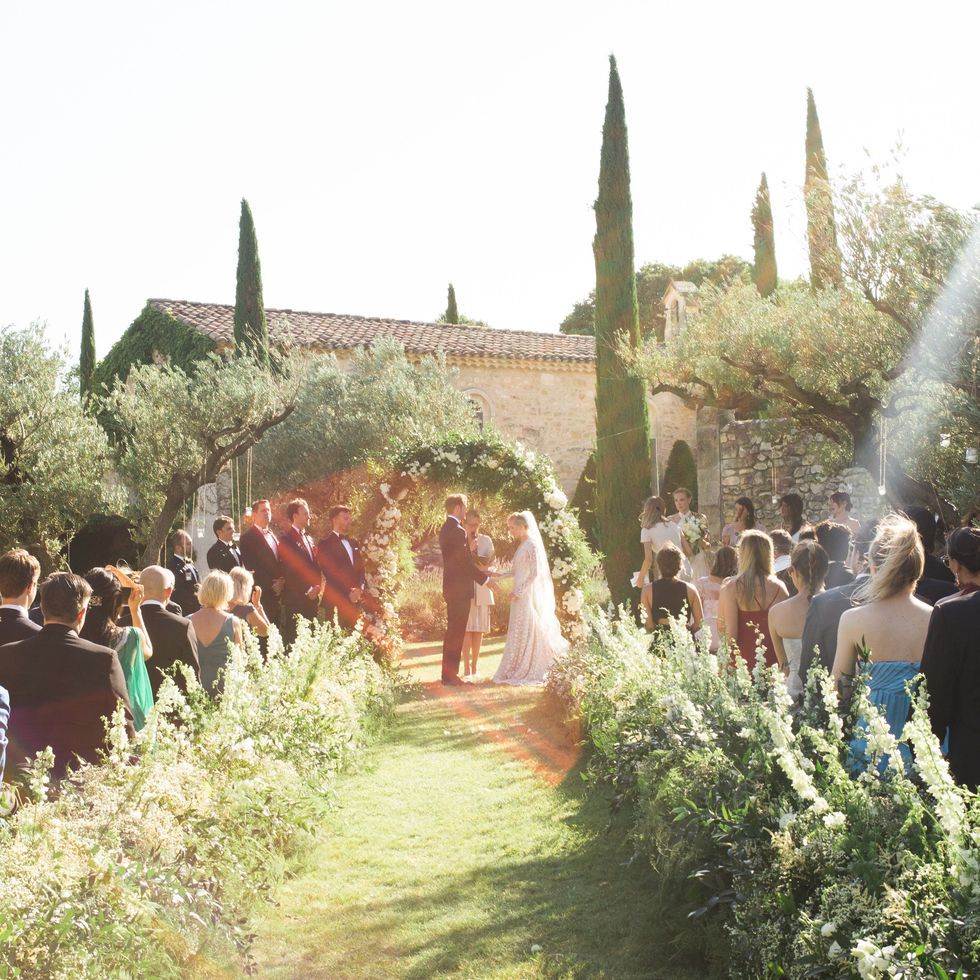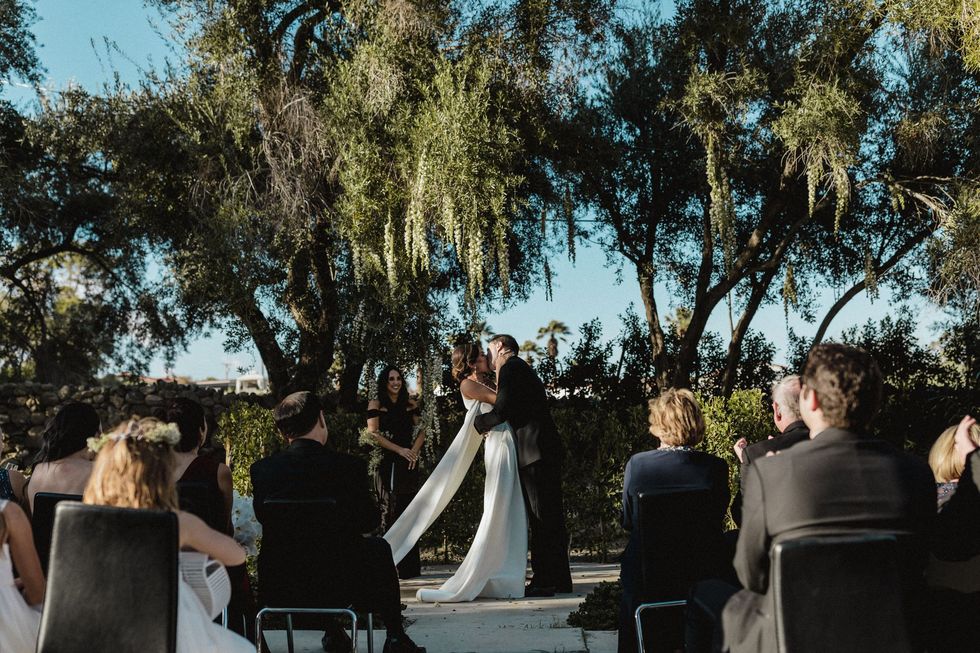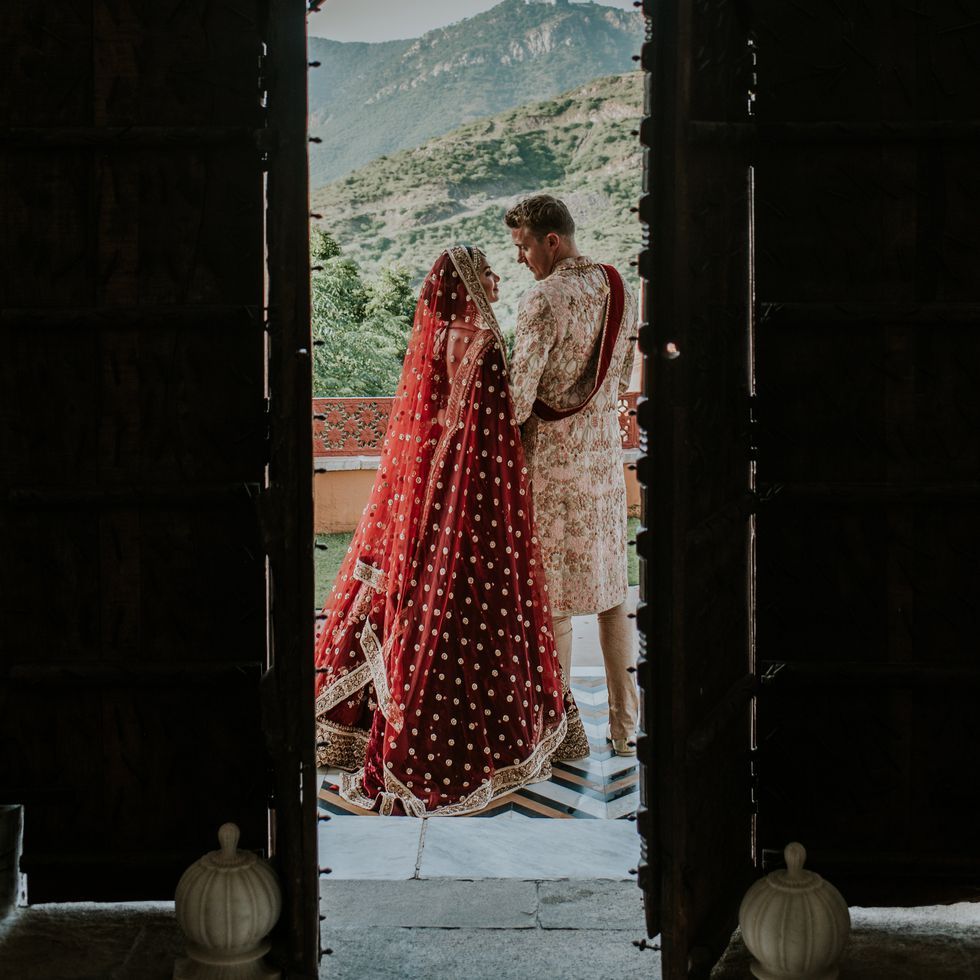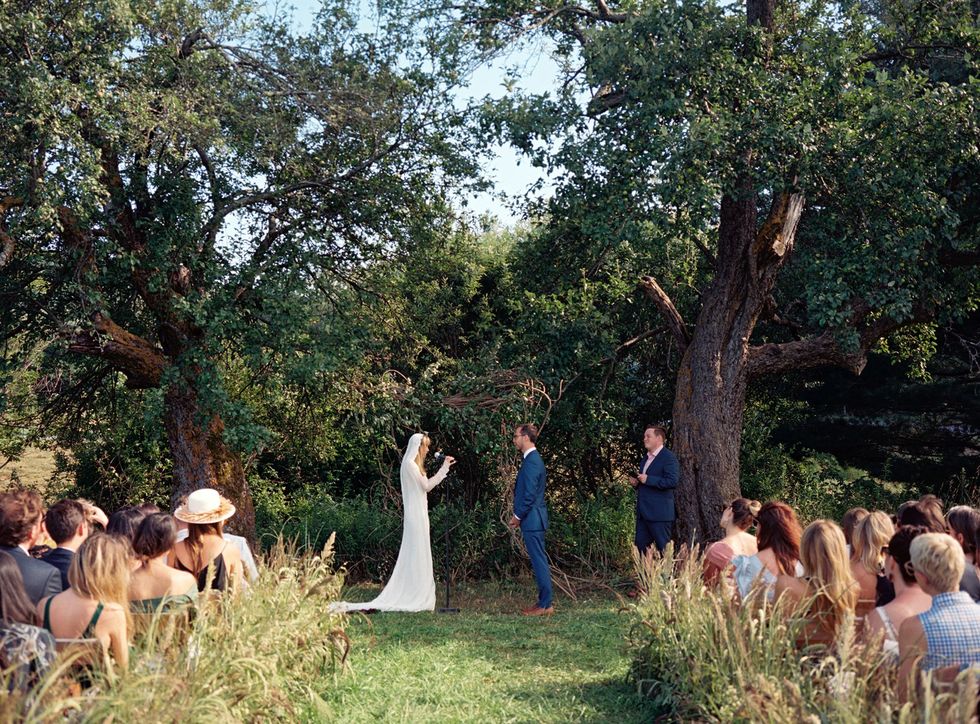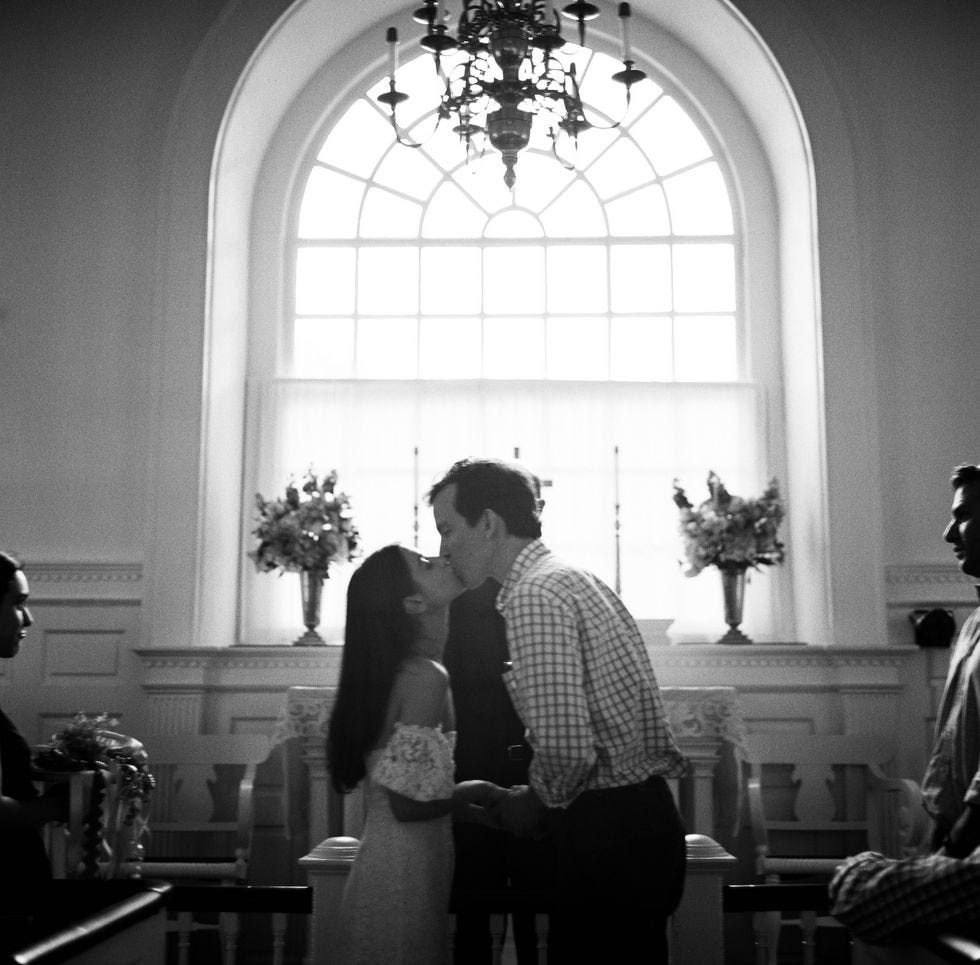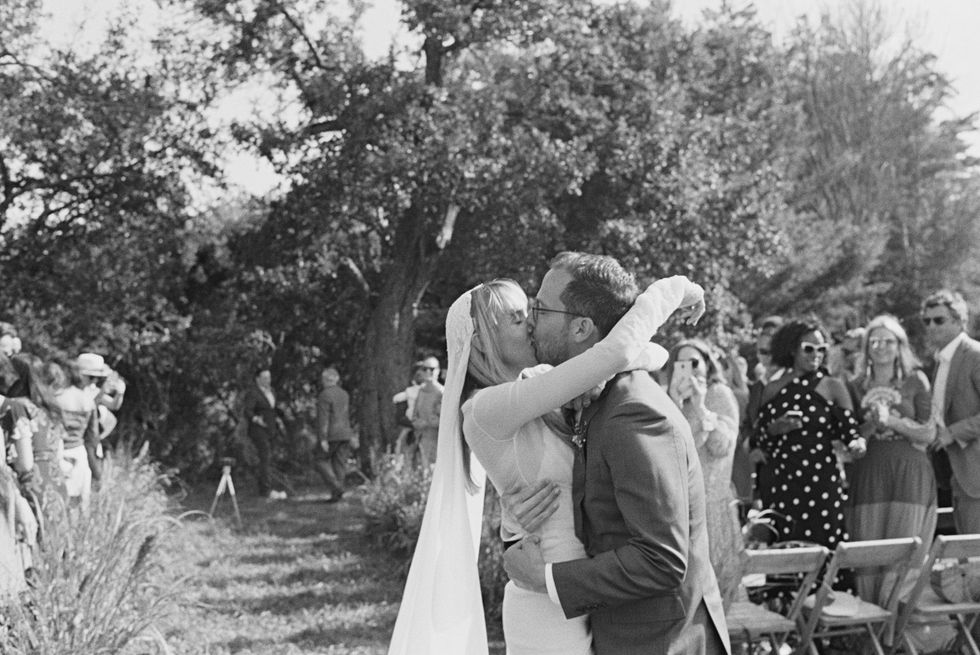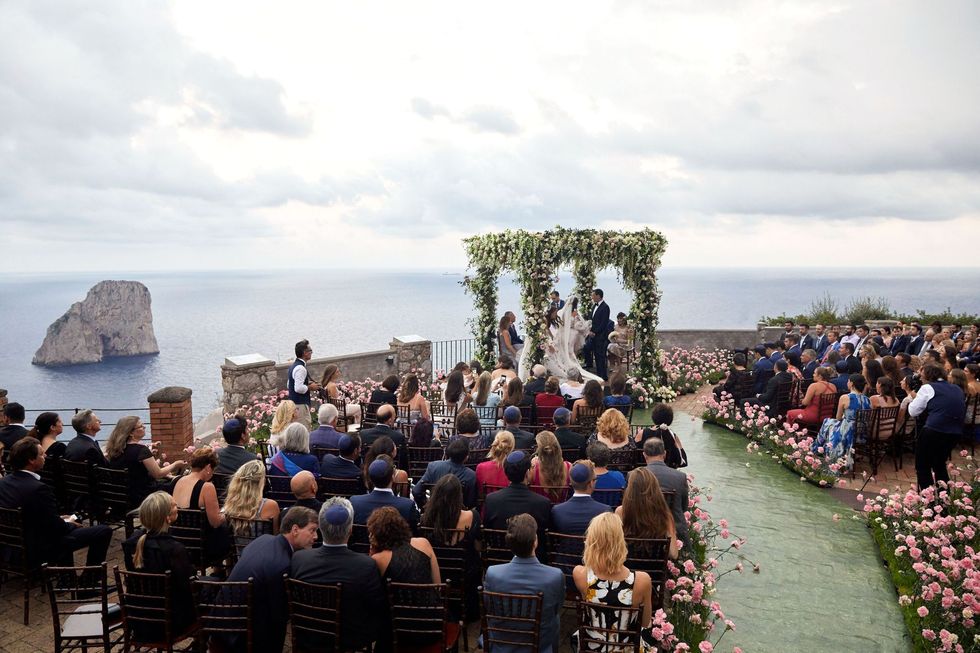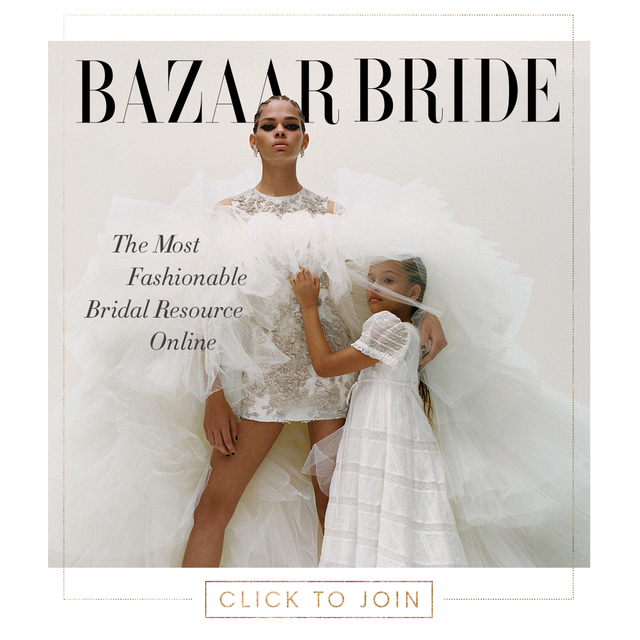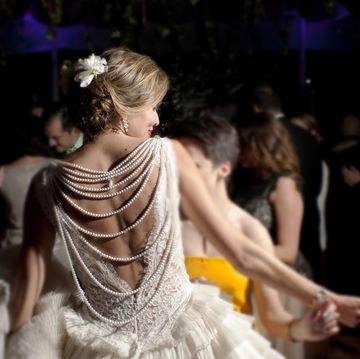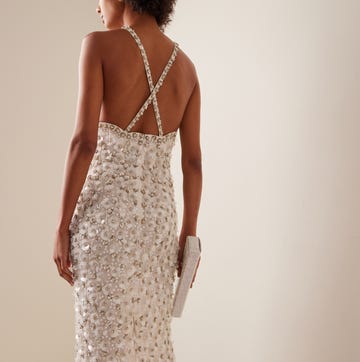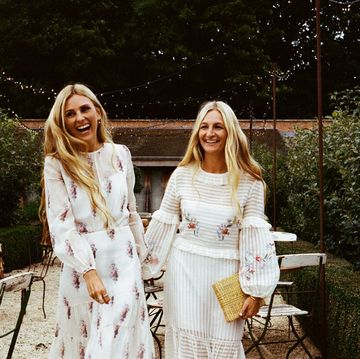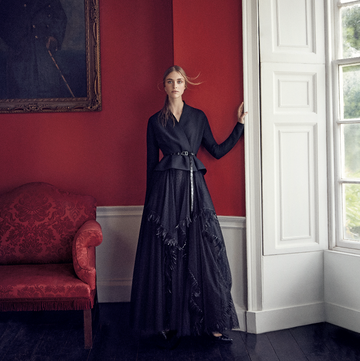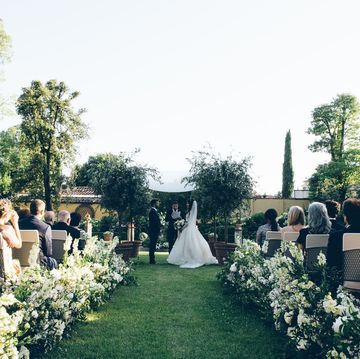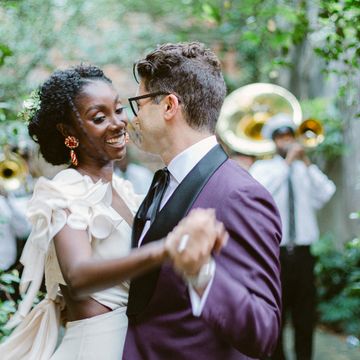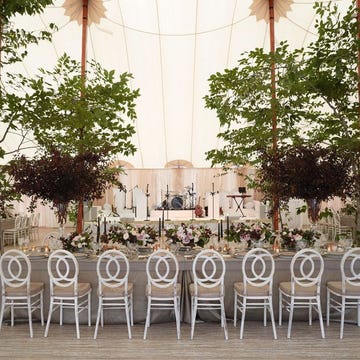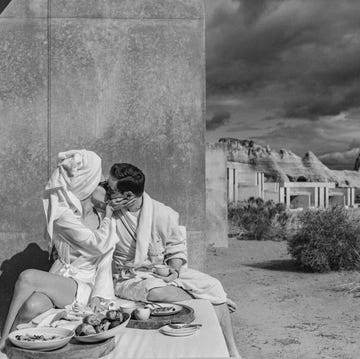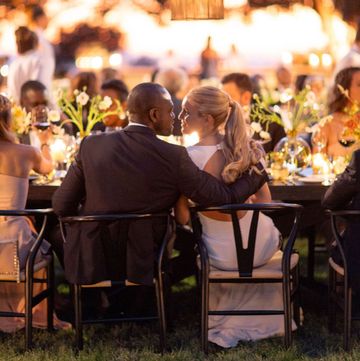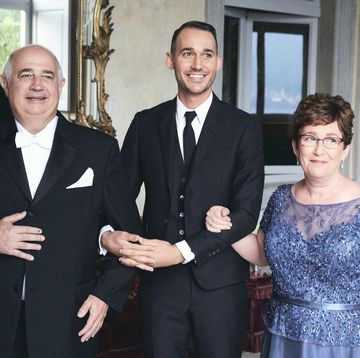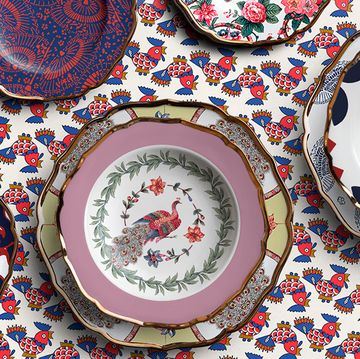Planning to skip the standard wedding vows repeated after your officiant and pen your own? Get on the same page with your future husband or wife and decide on the tone you're looking to set for your ceremony. You might choose to write your vows together, each reciting the same verses you compose as a couple to one another on the day of. Or, you may choose to keep your words private until the ceremony, using the wedding planning process to work on promises, memories, and an ode to your beloved you know will make them smile, laugh, cry, and feel luckier than they ever have before.
Here, our tips and tricks to writing the most romantic, humorous, and meaningful vows, along with some excerpts from BAZAAR.com editors' ceremonies, to (hopefully) inspire yours.
Know why you're writing your own vows.
Decide whether writing personal vows is right for you both, be it because you aren't religious, aren't a fan of simple civil vows, or because you're natural wordsmiths. To start, get to the root of why you've opted to express your commitment to each other in your own words by considering what's missing for you in the standard options out there.
You'll be able to best pin down your ideal tone and ceremony style by honing in first on what you don't want for your ceremony, be it a more meaningful touch, something that's unique and all your own, something non-religious, or something funny, witty, and anecdotal. This should also serve as the time to pinpoint what traditional elements you want to ensure make the cut, from readings of your choice recited by your loved ones, to a mix of both your own and traditional vows, etc.
Only do it if you're in it together.
A ceremony where one of you says a few words and the other repeats after your officiant doesn't send the message that you're independent, it hints that you're not on the same page. Decide as a duo to pen your own wedding vows, or to simply let the officiant do the talking for you, and repeat after him or her.
Anecdotes are best kept short.
Stories of how you met, proposed, or knew the other was the one are always welcome, but make sure they don't drag on. Your guests will only follow for a few fleeting moments if your memories include an abundance of "he said, she said," nor will they be able to grasp private jokes that only make the two of you smile but are harder for a larger audience to grasp. Remember, ceremony vows (like wedding toasts) are not roasts; wit and sarcasm is appreciated, but being snarky is not.
Read the classics.
Give traditional wedding vows a read for inspiration. Give the standard readings you plan to skip for a more unconventional touch a read while you're at it, too. Think of the classics as a blueprint to base your renditions on. You might find that while "I take thee..." feels a bit stuffy, modern takes on "to have and to hold from this day forward" feel fresh when reworded in your own tone.
Make it Personal.
Whether you opt for humor or are likely to bring your partner (and guests) to tears, write your vows as though you're speaking only to your spouse-to-be. This, unlike a toast or typical public speaking, should be looked at as more of a one-on-one conversation and dedication than a performance. While we suggest you use stories, jokes, and language most can understand, inserting truly personal moments will make your vows different from all others.
BAZAAR.com features director Olivia Fleming and her husband, Matt Rubin, opted to write their own vows for their Catskills ceremony, which were featured in their wedding story. In her vows, Olivia told Matt, "You have never made me question your love for me, not once...You’re the first to say sorry after an argument, even if I’m the one in the wrong...Each time I walk through the door, you look at me like I’m your entire world. You have taught me what real, deep, unconditional love is— and what it really means to feel at home." In Matt's vows to Olivia, Matt opened with when they first met: "I remember every moment that has led up to this one...Remember the first time we talked? I fell in love with you then and there. We were at a party. In you walked with your Annie Hall pants and brightness. I instantly knew there was something very special about you–you lit up the room. A week later, we had our first kiss outside of your apartment. It was the best moment of my life. In that moment, the world stopped..."
It's the tone, specificity, and yet the simplicity of vows like these that make hearts melt, and make your spouse feel like they're the only person in the room. Take the time to balance meaning with wit, and simplicity and everyday monotony with grand verbal gestures and your hopes for the future.
Keep it short.
Your intentions can easily get lost in length. Keep your vows to a maximum of 2-3 minutes, and don't be afraid to write down your thoughts to keep your vows concise and focused. Maintaining eye contact with your partner whenever possible keeps the mood intimate, but don't risk rambling by foregoing your notes altogether unless you're an experienced public speaker. If you're having trouble editing your thoughts down, put the rest in a private note to your partner to read before (or after) the ceremony.
Vulnerability is a virtue.
This is your time to be vulnerable. Your ceremony (and your wedding on the whole) is a space free of judgment, especially when it comes to matters of the heart. Even if you aren't the overly sentimental, romantic type, surprise your partner with sensitive touches to your vows that make them feel unique from any other time you've professed your affection.
Write it all down—then edit.
Start by simply putting your thoughts down on paper. Ignore the pressure to infuse wit, private jokes, or a beginning, middle, and end to your first draft. Like any writing venture, simply getting your thoughts out will allow for you to tweak, reword, and as you do, add what you think might be missing. The hardest part of writing wedding vows is getting started—skip that stress. Take your time, and despite the pressure, try not to leave your vows to the last minute; you'll appreciate having the time to rework them as time goes on, and you fall more and more in love with your partner.
Newlywed and BAZAAR.com beauty director Jenna Rosenstein wrote her vows throughout her engagement. "I started a private Google doc about a year before the ceremony, and wrote my vows piece by piece. I finished the rough draft in about a week, then tweaked word choices and anecdotes as time went by."
Practice out loud (literally).
Says Rosenstein of her wedding vow prep, "I practiced reading my words out loud in the shower where my fiancé couldn't hear me. I wanted my vows to feel incredibly intimate and personal to our relationship, so that when I was reading them it felt like I was truly talking to just him and not the crowd." Reading your words to yourself works in the editing process, but reciting them aloud to make sure the words flow easily, is highly recommended.
Insert a list of promises.
A vow, if nothing else, is a promise after all—and the most classic list of promises, vowing "to have, hold, love, and cherish, in sickness and in heath, until death do you part" may not be your style, but it's key to land on your own version, making sure you bolster any and all humorous moments with genuine sentimentality. Matt Rubin capped off his vows to Olivia Fleming with a personalized list of promises:
"I promise we will always have the most magical Christmas celebrations. I promise to bring you coffee every morning. I promise to catch you if you clumsily fall. I promise to always come up with wild business ideas just in case one of them works. I promise to always communicate, to be honest, to work through a disagreement and make up within 10 minutes of arguing...I promise to take care of you in whatever comes our way and to love you this much for the rest of my life."
Olivia, in turn, did the same: "I promise to never take you for granted and to always consider you in the big and the small. I promise to be patient...I promise to always laugh with you, even when what life throws us isn’t so funny. I promise to never stop listening to your needs and wants, and I promise to always be honest and open about mine. I promise to never stop finishing your sentences...And I promise to love you, unconditionally, always and forever."
However you choose to promise yourself to your partner, keep in mind what makes your connection unique and life-changing, and what makes the person you're promising yourself to your perfect match.
Be authentic.
No two relationships are the same, and some are downright different. Jenna Rosenstein and her husband, Kobi, share a love of Star Wars, and her vows reflected their love for the series' galactic themes. Between references to the stars in the sky, the moon, and beyond, Jenna repeated numerous reasons why the love that she and her husband shared was "cosmic" in her vows. The thematic language was neither over-the-top, nor hard to understand, but hinted at something they love and enjoy together.
While a flair for words isn't required to pen your own vows, we suggest also having a backup plan. Provide your officiant with a copy of your vows in case yours are forgotten, tear stained, or you find yourself too overcome with emotion to get them out on your own.
Want more expert advice and wedding planning tips? Become a BAZAAR Bride.

Carrie Goldberg is meltsflow.com’s Weddings & Travel Director. She oversees the site’s BAZAAR Bride channel, travel & dining content, and styles fashion and bridal editorials for BAZAAR.com. When she’s not traveling, she spends her free time in her hometown–New York City–where there is no shortage of new places to shop, eat, drink, see and explore.

